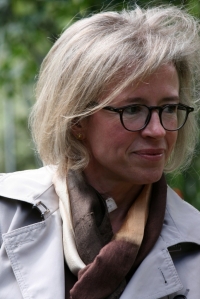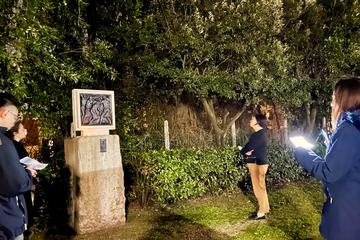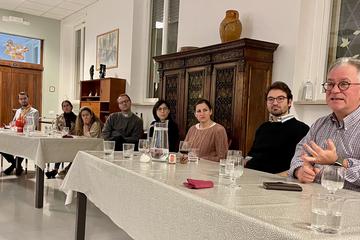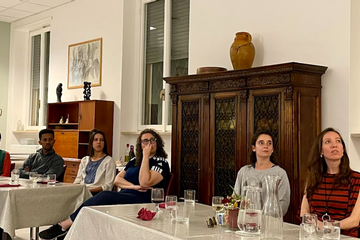
By Elena Dini
ROME — Prior to the Vatican summit on “The Protection of Minors in the Church,” The Lay Centre welcomed Father Michael Brehl, CSsR, Superior General of the Redemptorists, for Mass and dinner with the resident community Feb. 20. On that occasion, he asked everyone to pray for the important meeting of Pope Francis with the presidents of the world’s episcopal conferences, which he was to attend.
Weeks later, April 3, The Lay Centre was pleased to welcome Father Brehl once again for prayer, dinner and an informal discussion about the summit. He came with Dr Linda Ghisoni, undersecretary for the laity at the Dicastery for the Laity, the Family, and Life.
Dr Ghisoni took part at the preparatory commission and was impressed by “how all contributions were on equal terms and expression of free and honest thought,” she commented.
“I did not feel uncomfortable because of the disproportion in numbers,” she said, referring to the limited participation of women at the summit.
“Only two lay women – myself and Dr Gabriella Gambino, undersecretary for the family and life at the same dicastery – attended the whole summit and it was because the pope wanted to address the people in charge of communities to stress their accountability. But our voice was heard,” she said.
Dr Ghisoni insisted on the importance of deep listening at the summit.
“Every day of the summit started with a time of silence and prayer,” she said. “Listening was key to the whole process: first of all, listening to the testimonies of victims but also listening to each other in the working groups. Pope Francis himself was the model of this constant listening. He was there all the time listening carefully and he just briefly spoke on the first morning to introduce the summit.”
Father Brehl told The Lay Centre community that the three-day summit focused on one key theme each day: responsibility, that is, to help those gathered to accept the responsibility for the climate in which abuses were possible; the invitation to accountability; and transparency.
“I have been a priest since 1979, and I started my work on the east coast of Canada as the whole crisis of sexual abuse broke in Canada for the first time,” he said. “I was a mission preacher going around to parishes and many times I would go to a parish and have someone who had been abused come and speak to me. This was not always abused by priests.”
“When we began listening to the first collage of voices of victims, something changed in the room,” he said, returning to the topic of the Vatican summit. “I have never seen bishops and cardinals being so vulnerable to one another. They talked about their own pain in having to deal with these situations, about their learning and how this was painful, too, because they did not always know what to do.”
He said summit participants gathered for a celebration of reconciliation Feb. 23 — a moment of silence, conversion, vulnerability. On Sunday morning after Mass, Pope Francis gave a concluding address (read it here).
“His talk is very important to read,” said Father Brehl of the pope’s address. “It has been criticized and I think unfairly so. He spoke about the crisis of abuse of children on many levels, worldwide, not only sexual but all the different ways in which children are subjected to abuse. Some people said he was trying to minimize the responsibility for abuse in the Church, but if you read it you will see he was not doing that.”
“Pope Francis put things in the context that all of us have the responsibility for doing something about protecting children in the world where we live,” Father Brehl continued. “He gave eight points in his talk that must become directives for the whole Church. These can begin to form a policy for protection that should inform all our ministries.”
During the discussion with The Lay Centre community, Father Brehl was asked about the concrete actions that were suggested during the summit. He mentioned, as examples, that anyone convicted of abuse could not return to ministry and that there should be more than one person engaging in a ministry that involves children and youth in a community.
Dr Ghisoni closed by commenting on the importance of working on relationships.
“We are concerned about creating safe spaces, but spaces are never going to be safe enough,” she said. “I think we have to work on sane relationships and mature psycho-affective attitudes. The challenge is there: investing in formation to support sane and mature relationships.”


